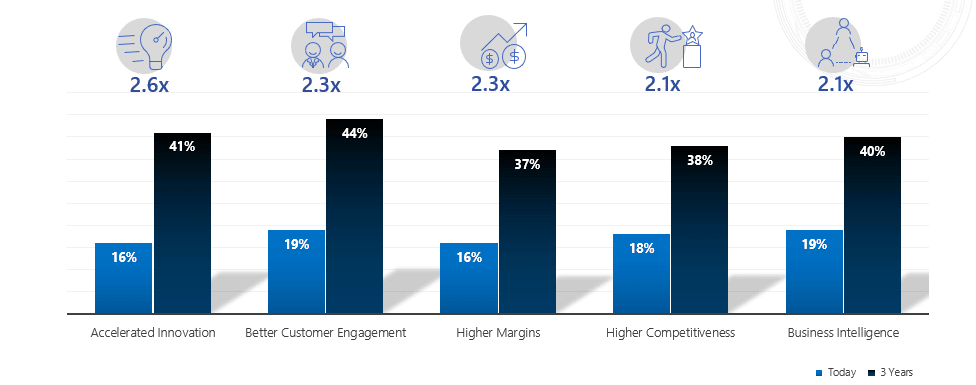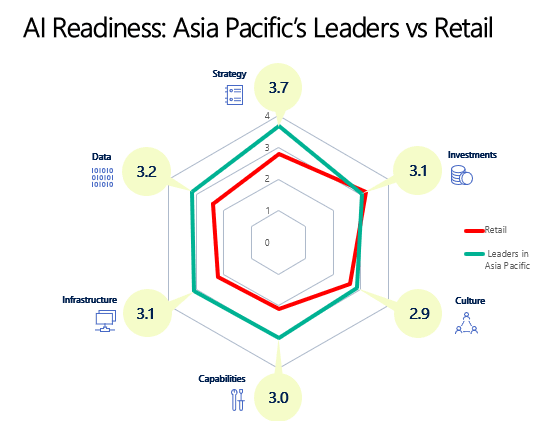The findings show underutilisation of AI despite its recognized medium-to long-term merits: the bottlenecks seem to be infrastructure and mindsets.
According to the latest findings from Microsoft Asia and IDC Asia/Pacific’s Future Ready Business: Assessing Asia-Pacific’s Retail Sector with AI study, retail organizations that have adopted AI are already seeing improvements of 16 to 19% in customer engagement, business intelligence, profit margins, competitiveness and innovation.
By 2021, retail organizations in the region are expected to use AI to drive further improvement of between 37 and 44% in these areas.

Said Raj Raguneethan, Regional Business Lead, Retail and Consumer Goods, Microsoft Asia: “Upended by a US$1.5 trillion e-commerce market, retailers in the region must quickly adapt to savvy, connected consumers that generate a trail of digital and omnichannel footprints that can be analyzed. These footprints are generated from consumers combining channels like mobile, app, in-store and desktop throughout the purchasing process.”
To stay competitive, a shift to intelligent retail is required to add ease, convenience, customization and automation—across business processes and operations, customer experiences, and the very products and services offered, said Raguneethan. “This can be done by turning to cloud and AI tools as the underlying, connective tissue for digitization and business transformation.”
Integrating Omnichannel Data to ‘Know Your Customer’
With AI and facial recognition technologies, companies such as video and sensor technology start-up Trakomatic Singapore, offer retailers a “customer service ecosystem” solution that is integrated with their customer loyalty programs. These solutions have been accredited by the SG:D program which is part of the Singapore government’s Digital Economy growth strategy.
If any very important customers opt-in to the program by signing up for the service, the AI technology at participating retail outlets will identify them once they enter the mall. The solution then sends these customers a personalized message such as an SMS, recommending them exclusive products at a store tailored to their buying history.
Along the way, the mall’s digital signage knows when the VIP is near and changes its content to reinforce the sent SMS. When the VIP arrives at the store, the system alerts the service staff via their devices, who can then engage the customer and offer a personalized experience or additional discounts.
Trakomatic’s shopper engagement module was introduced at the Lenovo Flagship Store in Singapore to address these demands, enabling the on-ground team to recognize, anticipate and serve customers proactively with data and insights.
Shared Constantia Ang, Sales Director, AddOn, a Lenovo distributor in Singapore: “Delivering great customer service is never easy for any brick-and-mortar store, as customers now increasingly demand nothing less than seamless shopper experiences across traditional and digital touchpoints. Ultimately, this helps staff make more informed business decisions.”
Besides enhancing the customer experience, such AI tools help retailers measure and improve the effectiveness of marketing campaigns, track sales conversion rates, and discover shoppers’ average basket size, as well as forecast which days and locations are likely to experience heavy traffic.
Said Shaun Kwan, co-founder and COO, Trakomatic: “Even as e-commerce is growing, consumers still want to touch and feel products. Merchants are therefore looking to marry the physical and digital to reduce their stores’ footprint, engage omnichannel consumers and grow their sales at the same time. Through the years, we have developed technology to securely collect and anonymize shopper data streams and have partnered with Microsoft to bring to life capabilities that are integrating digital and offline retail experiences.”
Building capabilities and infrastructure to tap AI
While the infusion of AI is proving to be a winning strategy, the following findings from Microsoft Asia and IDC Asia/Pacific also reveal that more needs to be done for the region’s retail sector to maximize AI’s potential:
• 71% of decision-makers in retail believe AI is instrumental to their organization’s competitiveness over the next three years, but only 33% have embarked on their AI journeys, putting retail behind other industry sectors.
• While retailers in the region prioritize transforming the customer experience and leveraging data for operational efficiency and insights, many currently lack the infrastructure and capabilities to successfully implement AI to achieve business growth.

• Decision-makers in retail underestimate their workers’ intent to reskill.

IDC brings up EZR as another example of a retail player that has transformed its capabilities and infrastructure to enable AI. As China’s next-generation customer relationship management (CRM) platform, EZR is integrating fragmented information on brands and customers onto its unified commerce platform. Powered by Microsoft Azure Machine Learning Service and Microsoft Dynamics 365, EZR allows retailers to understand customers’ digital behavior and deliver tailored interactions in-store and on social channels to shape purchase decision journeys.
Said Stephanie Krishnan, Retail Insights Research Director, IDC Asia Pacific: “Retail is in the process of being re-imagined in the Asia-Pacific region. Through the research commissioned with Microsoft, we see how, across sectors, the convergence of the physical and digital worlds brings the opportunity for data to be responsibly and intelligently utilized with AI. The retail sector continues to show promise in the new year. Facilitating investments in AI-enabling capabilities and infrastructure will be necessary for retailers to unlock the full potential of their operations and employees—and ultimately, future-proof their businesses.”
